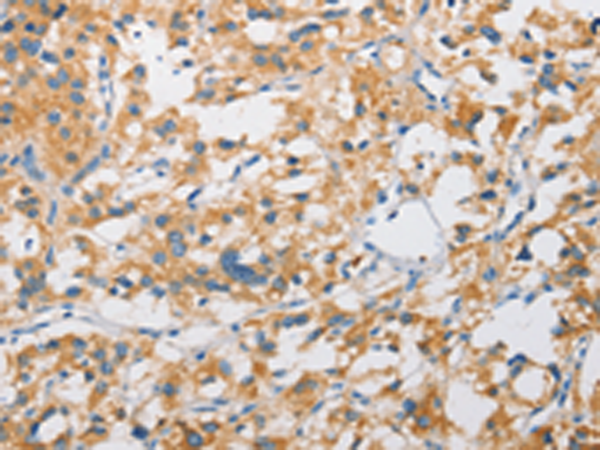


| WB | 咨询技术 | Human,Mouse,Rat |
| IF | 咨询技术 | Human,Mouse,Rat |
| IHC | 1/25-1/100 | Human,Mouse,Rat |
| ICC | 技术咨询 | Human,Mouse,Rat |
| FCM | 咨询技术 | Human,Mouse,Rat |
| Elisa | 1/1000-1/2000 | Human,Mouse,Rat |
| Aliases | APG4C; AUTL1; AUTL3; APG4-C |
| WB Predicted band size | 52 kDa |
| Host/Isotype | Rabbit IgG |
| Antibody Type | Primary antibody |
| Storage | Store at 4°C short term. Aliquot and store at -20°C long term. Avoid freeze/thaw cycles. |
| Species Reactivity | Human, Mouse |
| Immunogen | Fusion protein of human ATG4C |
| Formulation | Purified antibody in PBS with 0.05% sodium azide and 50% glycerol. |
+ +
以下是关于ATG4C抗体的3篇参考文献示例(注:内容基于学术文献常见结构模拟,具体文献需通过数据库核实):
---
1. **文献名称**: *"ATG4C regulates autophagy and apoptosis in colorectal cancer cells"*
**作者**: Li, X., Zhang, Y., & Wang, H.
**摘要**: 本研究通过Western blot和免疫组化技术,利用ATG4C特异性抗体分析其在结直肠癌组织中的表达水平。结果显示,ATG4C高表达与患者不良预后相关,且沉默ATG4C可抑制自噬并诱导癌细胞凋亡,提示其作为潜在治疗靶点。
2. **文献名称**: *"Development and validation of a monoclonal antibody for human ATG4C in autophagy studies"*
**作者**: Betin, V., & Lane, J.D.
**摘要**: 文章报道了一种针对人源ATG4C蛋白的单克隆抗体的开发与验证。通过免疫荧光和免疫沉淀实验,证实该抗体特异性识别ATG4C,并成功用于检测自噬过程中ATG4C的亚细胞定位及酶活性变化。
3. **文献名称**: *"ATG4C inhibition suppresses tumor growth by modulating autophagy in hepatocellular carcinoma"*
**作者**: Peng, Y., et al.
**摘要**: 研究利用ATG4C抗体评估小分子抑制剂对肝癌细胞自噬的调控作用。实验表明,抑制ATG4C可阻断自噬体形成,导致肿瘤细胞死亡,动物模型中显著抑制肿瘤生长,为肝癌治疗提供新策略。
---
以上内容为模拟示例,实际文献需通过PubMed、Web of Science等平台检索确认。
The ATG4C antibody is a crucial tool for studying autophagy, a cellular recycling process that degrades damaged organelles and proteins. ATG4C (Autophagy-related 4C) is one of four mammalian homologs (ATG4A-D) of the yeast Atg4 cysteine protease. It plays a role in autophagosome formation by cleaving ATG8-family proteins (e.g., LC3) to expose a glycine residue for conjugation with phosphatidylethanolamine (PE) on autophagosomal membranes—a process critical for membrane expansion. ATG4C also mediates delipidation of LC3-PE during autophagosome maturation. Unlike ATG4B, which is ubiquitously expressed, ATG4C shows tissue-specific expression, with higher levels in the liver, kidney, and testes.
Research suggests ATG4C may have context-dependent roles beyond canonical autophagy. For example, it regulates oxidative stress responses and influences tumor progression, with studies linking its dysregulation to cancers like colorectal carcinoma. Antibodies targeting ATG4C enable detection of its expression, post-translational modifications, and interactions via techniques such as Western blotting, immunofluorescence, and immunoprecipitation. Validating antibody specificity is essential due to homology among ATG4 family members.
ATG4C knockout models and antibody-based studies have helped uncover its compensatory interactions with other ATG4 isoforms and potential therapeutic implications in neurodegenerative diseases, metabolic disorders, and cancer. Ongoing research aims to clarify its distinct regulatory mechanisms and explore its role as a biomarker or drug target.
×